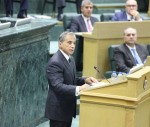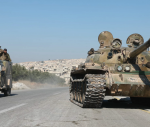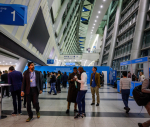You are here
A better future for the Congo
Apr 21,2018 - Last updated at Apr 21,2018
LONDON — The Democratic Republic of Congo (DRC) has become synonymous with state failure. No country has endured more brutal conflicts, hosted more kleptocratic and corrupt governments, or squandered more resource wealth. Trapped in a cycle of political uncertainty, economic recession and escalating violence, humanitarian disaster has become a way of life. Yet, a better future is possible.
At the ramshackle Rubaya primary school, in a small town in the lush green hills of North Kivu province, bordering Rwanda, one gets a glimpse of that possibility. Children sit attentively in overcrowded classrooms, with enthusiasm, ambition, and hope lighting up their faces. Dorothy Gakoti, aged 13, wants to become a nurse. “If I succeed in school, I can have a better life with more opportunity — and I can help my family and community,” she declares.
Yet, the DRC — including North Kivu — remains beset with challenges. Dozens of ethnically based armed groups called Mai-Mai prey on local populations. Sexual violence, often targeting young girls, is as endemic as it is under-reported. Some 4.5 million children are malnourished, almost half of them severely. Less than half of the children who contract potentially deadly diseases like pneumonia and malaria receive treatment.
Making matters worse, about one-quarter of the DRC’s school-age children are not receiving any education at all. And those who do go to school face abysmal learning outcomes: Dorothy does not have a book or pencil to her name, and she struggles to understand French, the language of instruction.
Yet, writing off the DRC as a development failure would be a mistake. Since the end of a devastating five-year war in 2003, the country has made marked gains. While two-thirds of its people still survive on less than $1.25 per day, poverty and child mortality have fallen, while rates of immunisation and school enrollment are rising.
Moreover, the DRC has vast untapped economic potential. It possesses over half of the world’s known reserves of cobalt (a key component in computer chips and lithium-ion batteries) and around 80 per cent of the world’s supply of coltan (a heat-resistant metal used in mobile phones and other devices). The country is also a major producer of copper, gold, tin, tungsten and diamonds. Add to that fertile soils and some of the world’s greatest hydro-power potential, and the DRC should be a regional, if not continental, economic powerhouse.
What explains the disconnect between the DRC’s vast economic potential and the condition of its children? For starters, the government has failed to create a tax system to mobilise resources for public investment in health and education. In fact, the DRC has one of the world’s lowest revenue-to-GDP ratios, with foreign actors and local vested interests effectively pillaging the country.
In his novel “Heart of Darkness”, set in the DRC, Joseph Conrad wrote about what he later described as “the vilest scramble for loot that ever disfigured the history of human conscience”. Yet even Conrad would have been aghast at the windfall gains and rock-bottom tax rates that foreign mining investors have secured over the last decade.
Both the International Monetary Fund and the World Bank have criticised the excessive generosity of the deals provided for foreign investors in mining, despite having designed and pushed them. The US Treasury Department has accused one foreign investor of gaining $1.3 billion — more than five times total government health financing in the DRC — through “opaque and corrupt” deals.
The lack of government revenue is directly reflected in under-investment in public services. Parents seeking treatment for a malaria-stricken child, or a place for that child in school, must pay from their own pocket — an impossibility for many. As crowded as the Rubaya primary school’s classrooms are, every child I spoke to there had a sibling not attending school, because their family could not cover the fees — around $10 per term.
Political turbulence has further disrupted development efforts. The election that President Joseph Kabila was supposed to have called in 2016 is now scheduled for December 2018 – a delay that has intensified grievances and spurred violence.
Last year, some 2 million people in the DRC, half of them in the previously peaceful central province of Kasai, were forced to flee their homes. The total number of internally displaced people now stands at 4.5 million — second only to Syria in current conflicts — while another 750,000 have fled to neighbouring countries. These displaced people and refugees are living in desperate conditions, without adequate shelter, nutrition and healthcare, and with virtually no access to education.
Boosting productivity and creating jobs for the more than 1.5 million workers entering the labor market each year are essential to put the DRC on a different, more hopeful path. Here, education is critical. Each additional year of schooling is associated with a 9 per cent increase in income. Expanded opportunities for learning would thus go a long way toward reducing poverty, especially given that almost half of the DRC’s population is under 15 years of age. But improved access to education must go hand in hand with strategies to combat child malnutrition and poor health.
Education for all and universal health provision hold the key to a better future for DRC’s children. Progress will require the next government to take urgent action to build a tax base. More immediately, unless an effective response to the DRC’s escalating humanitarian crisis is mounted this year, the level of suffering will be immense — and not just in the country itself. As neighbouring countries know all too well, what happens in the DRC often does not stay in the DRC.
An emergency summit planned for this week in Geneva is an opportunity for donors to stave off the worst, by providing the $1.7 billion the United Nations estimates an effective response will require. That will require donors to abandon their short-sighted and wrong-headed perceptions of the DRC as a lost cause, and instead help the country build the future that its children deserve.
Kevin Watkins is the CEO of Save the Children UK.
Copyright: Project Syndicate, 2018. www.project-syndicate.com












